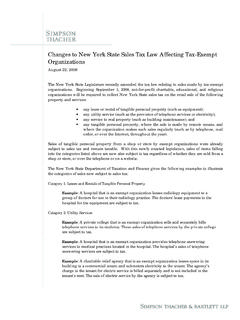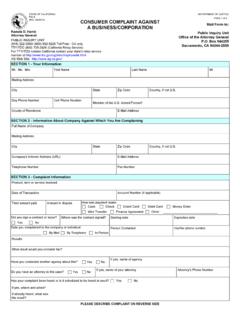Transcription of California’s False Claims Act: What it Means for Companies ...
1 california s False Claims Act: What it Means for Companies doing business with california governmental entities May 31, 2011 california attorney general kamala harris announced on May 23, 2011 that she is creating a team of seventeen lawyers and eight special agents to pursue sellers of mortgage backed securities and alleged perpetrators of mortgage-related fraud using california s False Claims Act. She explained that the False Claims Act is one of the very powerful tools that california uniquely has. Indeed, just days prior to the attorney general s announcement, on May 19, 2011, california formally approved a $241 million settlement with Quest Diagnostics, Inc.
2 To resolve a False Claims Act case alleging that Quest overcharged california s Medi-Cal program. This bulletin discusses the california False Claims Act, its distinctive provisions, and what they mean for Companies doing business with the State at a time when the economic climate gives members of the qui tam bar compelling incentives to find new ways to help the State generate revenue through litigation. california S False Claims ACT In 1987, california became the first state to adopt a False Claims Act, california Government Code 12650, et seq. (the CFCA ). The CFCA is modeled after the federal False Claims In general , the CFCA prohibits any person or entity from knowingly presenting or causing to be presented, a False or fraudulent claim for payment or approval, 2 or knowingly making, using, or causing to be made or used, a False record or statement material to a False or fraudulent claim.
3 3 To violate the CFCA, the conduct at issue must usually be done knowingly but a specific intent to defraud a higher standard is not Actions undertaken with deliberate ignorance of the truth or in reckless disregard of the truth of a claim are sufficient to satisfy the required state of Nevertheless, innocent mistakes or good faith errors do not equate to acting knowingly and the information submitted to the government must be objectively False for liability to 1 The federal False Claims Act, 31 3729, et seq.
4 , was enacted in 1863 to redress Civil War defense contractor fraud against the government. 2 Wells v. One2 One Learning Found., 39 Cal. 4th 1167, 1187 (2006). 3 Cal. Gov t Code 12651(a)(1) and (2). 4 Cal. Gov t Code 12650(b)(3) ( Proof of specific intent to defraud is not required. ). 5 Thompson Pacific Const., Inc. v. City of Sunnyvale, 155 Cal. App. 4th 525, 549-50 (2007). 6 San Francisco Unified Sch. Dist. v. Laidlaw Transit, 182 Cal. App. 4th 438, 453 (2010); Cal. Gov t Code 12651(a)(1) (8). Page 2 Memorandum May 31, 2011 The CFCA allows the government, through the attorney general or local prosecutors, or individual citizens, to bring civil actions to recover damages, penalties and costs when government contractors, vendors or others defraud the government.
5 For purposes of the CFCA, government includes both state and local governmental entities . The ultimate purpose of the [CFCA] is to protect the public fisc by, among other things, authorizing private citizens who discover fraudulent Claims to file a qui tam action on behalf of the While the State of california may file a CFCA suit itself,8 a private party also may file suit. Individuals who bring these actions are interchangeably known as whistleblowers, qui tam plaintiffs or relators, and are permitted to file suit in the name of the government. Initially, the suit must be filed under seal and the defendant is not served with the complaint.
6 A qui tam plaintiff must serve the attorney general with a copy of the suit and the attorney general has 60 days to decide whether to intervene, , join the suit. In the event the attorney general intervenes, the State of california will primarily conduct and prosecute the action. The attorney general may also decline to intervene and, in that event, the qui tam plaintiff will proceed to prosecute the Qui tam plaintiffs file hundreds of cases each year and since 1986, federal and state False Claims act recoveries have regularly been in the billions each To incentivize qui tam plaintiffs to root out corruption and fraud against the government, lucrative rewards are provided if the case resolves in favor of the plaintiff whether by settlement or otherwise.
7 In the event a False claim is found to have been made, the CFCA provides for automatic punitive-like treble damages plus statutory penalties between $5,000 and $10,000 for each False SIGNIFICANT ASPECTS OF california S False Claims ACT Essentially, any knowing submission of a False claim to a public state agency may constitute a violation under the CFCA. There are eight specific types of False Claims enumerated in the CFCA. Any person who commits any of the following acts will be liable under the CFCA: (1) presenting a False claim to the government for payment;12 (2) making or using a False record;13 (3) conspiring to commit any violation of the CFCA;14 (4) delivering of less property 7 Wells, 39 Cal.
8 4th at 1187, 1196. 8 Cities and counties in the State of california may also file suit. Cal. Gov t Code 12650(b)(5) (7). 9 Cal. Gov t Code 12652(c). 10 In Fiscal Year 2010, the United States Department of Justice recovered $3 billion in False Claims act settlements and judgments. See Press Release, Dep t of Justice (Nov. 22, 2010) (available at ) (last visited May 24, 2010)). Recoveries since 1986, when Congress substantially strengthened the civil False Claims Act, now total more than $27 billion. Id. 11 Cal. Gov t Code 12651(a). 12 Cal. Gov t Code 12651(a)(1) ( Knowingly presents or causes to be presented a False or fraudulent claim for payment or approval.
9 13 Cal. Gov t Code 12651(a)(2) ( Knowingly makes, uses, or causes to be made or used a False record or statement material to a False or fraudulent claim. ). Page 3 Memorandum May 31, 2011than bargained for;15 (5) making or delivering a False receipt;16 (6) making a False purchase;17 (7) making a reverse False claim , using a False claim or record to decrease what is owed to the government;18 and (8) inadvertently being a beneficiary of a False Federal case law, which california may consider in interpreting the CFCA, has stated that the government need not prove it suffered damage or actually paid the claim for liability to attach under the Discussed below are three significant features of the CFCA that render it a powerful tool in pursuing Claims against those doing business with the State.
10 Inadvertent False Claim A unique aspect of the CFCA, and one that distinguishes it from the federal False Claim Act, is the inadvertent False claim provision. This section arguably imposes a responsibility to report a False claim if you have received the benefit from an inadvertent submission of a False claim and you subsequently discover the falsity of the In the event you do not report this False claim, you could be liable under the CFCA. Under the existing case law, it is unclear whether this statute applies only to the party that submits the False claim or to third party beneficiaries of a False claim submitted by another.






